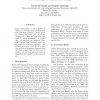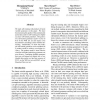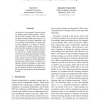30 search results - page 1 / 6 » Self-Training for Biomedical Parsing |
ACL
2008
13 years 6 months ago
2008
Parser self-training is the technique of taking an existing parser, parsing extra data and then creating a second parser by treating the extra data as further training data. Here ...
EMNLP
2009
13 years 2 months ago
2009
We investigate the effectiveness of selftraining PCFG grammars with latent annotations (PCFG-LA) for parsing languages with different amounts of labeled training data. Compared to...
COLING
2008
13 years 6 months ago
2008
Self-training has been shown capable of improving on state-of-the-art parser performance (McClosky et al., 2006) despite the conventional wisdom on the matter and several studies ...
EMNLP
2010
13 years 2 months ago
2010
We study self-training with products of latent variable grammars in this paper. We show that increasing the quality of the automatically parsed data used for self-training gives h...
ACL
2011
12 years 8 months ago
2011
We propose a non-parametric Bayesian model for unsupervised semantic parsing. Following Poon and Domingos (2009), we consider a semantic parsing setting where the goal is to (1) d...



